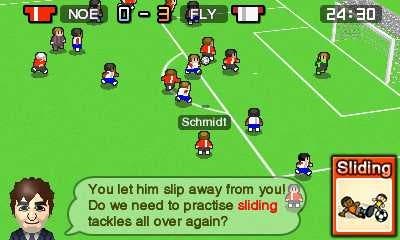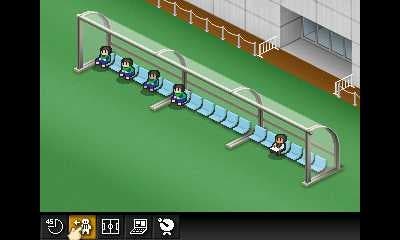Nintendo Pocket Football Club review
A funny old game.
"Making games isn't a process of just adding more and more until you have something amazing. Rather, the aim is to be able to take things away and yet ensure it still works." Satoru Iwata was talking about Nintendo Pocket Football Club with creator Hiroyuki Sonobe, but his words could equally apply to the other football management game of the moment, as Football Manager 14 Classic arrives on Vita.
Sonobe's claim that he "[doesn't] really want to create full simulations" would suggest a game diametrically opposed to the Football Manager way of doing things - after all, few games recreate a real sport in quite such exhaustive detail. And yet by stripping the game to its essentials for Football Manager 2013's Classic mode, Sports Interactive enjoyed its healthiest sales in years. The full simulation remained for those who liked to dig a little deeper, while dabblers could ignore the day-to-day minutiae of running a football club and focus their attention on match day.
Nintendo Pocket Football Club offers an even more reductive approach - and for many, it might just take away too much. Other than the half-time interval, there's no way to change your tactics during a game without making a substitution. You can't set individual player strategies, and while you can highlight up to three potential dangers in your pre-match briefing, you won't be able to assign specific players to man-mark them. There's no way to define set-piece tactics beyond selecting individuals to take penalties, free-kicks or corners. You'll never deal with the media or your chairman, and you can't discipline players for poor performances or reward them for good ones.

You're also forced to watch every game in its entirety. Each match is roughly 10 minutes long, and while seasons only last 10 games, you'll need to play 45-minute practice matches or 90-minute friendlies to experiment with tactics and earn special cards which represent the only way to train your players. As such, an average campaign will take around 8-10 hours to get through, and that's assuming you don't progress very far in the late-season cup competition. It doesn't sound like a huge undertaking, but given that its streamlined approach to management is likely to turn off those looking for a more thorough simulation, on paper it's hard to see who the game is made for.
Good job, then, that the matches themselves are so entertaining. It looks terribly rudimentary in screens, yes, but after you've watched a handful of games you'll understand why Pocket Football Club took Sonobe and his tiny team at ParityBit six years to refine. Few management games effectively capture the ebb and flow of the real thing, or realise that the beautiful game can often be quite ugly.
You'll see no-nonsense full-backs hoof the ball into the stands, while lower-league games can often degenerate into midfield wars of attrition, possession changing hands every few seconds. Players will be caught out of position, get bumped off the ball, and commit fouls with a frequency that you simply don't see in other sims. Gilt-edged chances will be ingloriously blazed over and offside traps will fail, allowing opponents a free run on goal. Your keeper may resort to an ill-advised punch instead of catching a cross, and will occasionally be caught off his line, retreating only to tip a perfectly-judged lob into his own goal. It's not always pretty, and sometimes it doesn't quite ring true - you'll find players stray a little too far from their natural positions at times - but these mistakes make your players feel recognisably human rather than AI robots going through the same old routines.

You'll witness all of that and more fairly frequently in the early game as you attempt to steer your no-hopers in the Beginner League toward glory. And for many, it'll be a chastening start to their managerial career. It took me seven games to earn a victory, and five to score a goal. With your team struggling to find its shape on the pitch, it can be difficult initially to see where you're going wrong.
But these experiences are crucial to the development of your team in two ways. Firstly, because you'll earn cards during games based on sporadic observations from your avatar - represented here by your Mii in a suit. The cards come in four varieties (Tactical, Technical, Physical and Support) and they allow you to train individual attributes of specific players, from speed to stamina, technique to willpower. It'll take a while to boost their grades - though progressing from E to D is much quicker than A to S - but you can combine two or three cards for a more substantial impact.
While it can seem random, the combos do follow a certain logic (Shooting and Stretching gives you a Volley Shot; Sliding and Visualising becomes Intercepting), but in truth working out the various combinations should come second to figuring out which abilities to focus on. Only by doing this will you be able to truly shape your squad.
That's because a player's type ultimately dictates how he'll perform. Each begins as a Balanced type but can be converted by training in specific areas. In the early game, you'll want to focus on stamina so your team isn't completely knackered just after the hour mark - thus risking injury if fatigued players aren't substituted - but once your first defender becomes a Stopper or a striker turns into a Sprinter, you'll want to experiment some more.
As someone who still thinks Sensible World of Soccer might be the finest footy game ever made, I found it to have similar charm and character

An early focus on technique transformed my lone striker De Winter into an Explorer, and he started dropping deep to collect the ball from midfield. I played an opponent with two Seekers in their back four, their high passing rating allowing them to ping long balls to their forwards. Before too long you might have a midfield trio of Dynamos or Mavericks. By the end of the second season, my left winger Svoboda was the fastest player in the league, regularly outpacing opposing right-backs, while my one extravagance - attacking midfielder Olsen took up an eighth of my total wage bill - ended up with a record 12 assists from 10 games playing in the hole behind my frontman.
Though your wage bill is increased after promotion, Nintendo Pocket Football Club doesn't really allow you to buy your way to glory. Rather, you're encouraged to nurture the talent already at your disposal, transforming the way your team plays by playing to their individual strengths. It's here that you realise the wisdom of ParityBit's decision to force you to watch every game. The sense of progression is tangible: save a video of the first game you play and compare it to an end-of-season match and the differences are immediately apparent. Even beyond the obvious stepovers and shimmies, the thumping volleys and delicate lobs, it paints a picture of a group of individuals gelling as a team.
The animation is hilariously basic, but as someone who still thinks Sensible World of Soccer might be the finest footy game ever made, I found it to have similar charm and character. There's a genuine thrill to watching a cross arc impossibly into the box and seeing your striker leap twice his height to power in a header off the underside of the bar. Indeed, the presentation reflects the game's ethos: it's not about spending lavish amounts of money, but embracing your limitations and learning to work within them to produce the best possible results.
In all honesty, I can't recommend Nintendo Pocket Football Club without some pretty serious caveats. Some will find it far too limited; others will resent having to sit through apparently meaningless friendlies just to grab a few more cards and try to stumble upon a winning combination. But its old-fashioned mentality won me over: while other sims can seem to favour a rather coldly analytical approach to management, here you feel as much a fan as a manager, cheering your team on from the sidelines. It might take away much of what makes a truly authentic sim, but in doing so it gives back plenty besides.









